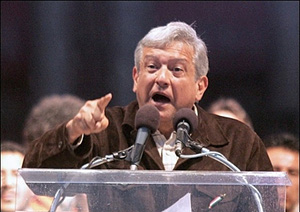 |
 |
 |
 Editorials | At Issue | September 2006 Editorials | At Issue | September 2006  
Political Unrest Tough to Tame as Mexico Boils
 Chris Hawley - azcentral.com Chris Hawley - azcentral.com


| | Mexican presidential candidate Andres Manuel Lopez Obrador delivers a speech to followers in Mexico City's Zocalo Square. (AFP/Luis Acosta) |
Conservative Felipe Calderón could be in for months, perhaps years, of political unrest even after a court on Tuesday upheld his razor-thin victory in Mexico's July 2 presidential election.

The election has exposed seething discontent in this country of 103 million people. Many Mexicans are exasperated by Mexico's persistent poverty, feel ignored by the government and are convinced that Calderón used fraud to beat leftist Andrés Manuel López Obrador.

"There is a real danger of a deterioration of the entire political system," said William Ackroyd, an expert on Mexican politics at Arizona State University. "There is a hard core of people that are really alienated."

The drawn-out election and court process are unprecedented in Mexico, where for decades one party picked presidents in back rooms, dissent was squashed and the biggest worry was whether the peso would devaluate as the old leader left office.

This time, the new president will face serious resistance from both average citizens and a powerful political opposition.

The court decision

On Tuesday, the Federal Electoral Court upheld the fairness of the election in a 309-page decision that examined everything from attack ads to supposed political messages embedded in Mexican soap operas. The seven justices then unanimously named Calderón the winner by 233,831 votes, or a little more than half a percentage point.

Calderón urged Mexicans to unite behind him.

"Mexico is more than individual interests," he told a crowd Tuesday night. "Being a Mexican is more important than belonging to a political party."

The court's decision cannot be appealed. The 44-year-old Calderón will take office on Dec. 1. Current President Vicente Fox is limited by the constitution to one six-year term.

For the United States, Calderón's victory means six more years of the pro-business, pro-American policies championed by Fox. Mexico is the United States' second-biggest trade partner after Canada, its second-biggest supplier of oil after Canada and a powerful counterbalance to leftists like Hugo Chavez of Venezuela.

But although Americans may like the Harvard-educated Calderón, his standing with Mexicans is more precarious.

"I don't trust him. He doesn't care about the poor at all," said Eugenia López, one of thousands of protesters in Mexico City.

Many Mexicans see little improvement in their lives despite six years of low inflation and a stable peso under Fox. About 40 percent of the country lives below the poverty line, and even those with steady jobs find it hard to make ends meet. The average factory worker in Mexico makes $2.79 an hour; a gallon of milk costs $3.50.

The average income in Mexico is $10,000 a year, compared with more than $41,000 in the United States.

That disparity prompts hundreds of thousands of Mexicans to cross illegally into the United States in search of higher-paying jobs.

"A lot of people feel they're not being represented and that not enough is being done to help the poor," said Maureen Meyer, a Mexico expert at the Washington Office on Latin America, a think tank. "Those divisions in Mexico have been brought into focus by these elections."

Calderón's power base is in industrialized northern states that stand to gain from the North American Free Trade Agreement, a worldly outlook and fewer taxes. Mexico's small middle class and rich business leaders are drawn to Calderón's pledge of economic stability.

Loser has support

Meanwhile, López Obrador made helping the poor the main focus of his presidential campaign. He promised a nationwide pension for everyone over 70, vowed to raise the $4.50-a-day minimum wage, and campaigned with the slogan "For the good of all, the poor first of all."

Most states in Mexico's poor Indian south voted for López Obrador. Such places have few factories, underfunded schools and a long history of racial discrimination.

López Obrador insists that Calderón used fraud to win, even though international observers and a partial recount earlier this month found no evidence of widespread wrongdoing.

Government-in-exile

López Obrador has suggested he may name himself president and form a government-in-exile to harass the Calderón's administration. He has already told his supporters to prepare for years of civil disobedience.

"Let's create a government that has the legitimacy necessary to refound this republic," he told a crowd of supporters Tuesday night.

His followers have pitched tents in the middle of Mexico City's Reforma Avenue, tangling rush-hour traffic in the world's second-biggest metropolis, behind Tokyo.

They have also briefly blockaded banks and temporarily seized highway toll booths.

In one of the most dramatic protests, legislators from López Obrador's Democratic Revolutionary Party seized the podium just before Fox's State of the Union address before Congress on Friday.

López Obrador is threatening to disrupt Independence Day celebrations in Mexico City on the night of Sept. 15. He may also block an annual military parade the next day, forcing a possible showdown with the army.

His supporters have vowed to heckle and embarrass the new president at every public event in an attempt to undermine his authority.

López Obrador may also try to hamstring Congress, where Calderón's National Action Party has put together a fragile coalition. Fierce opposition in Congress repeatedly foiled Fox's attempts at government and economic reform.

Reach the reporter at chris.hawley@arizonarepublic.com. | 
 | |
 |



